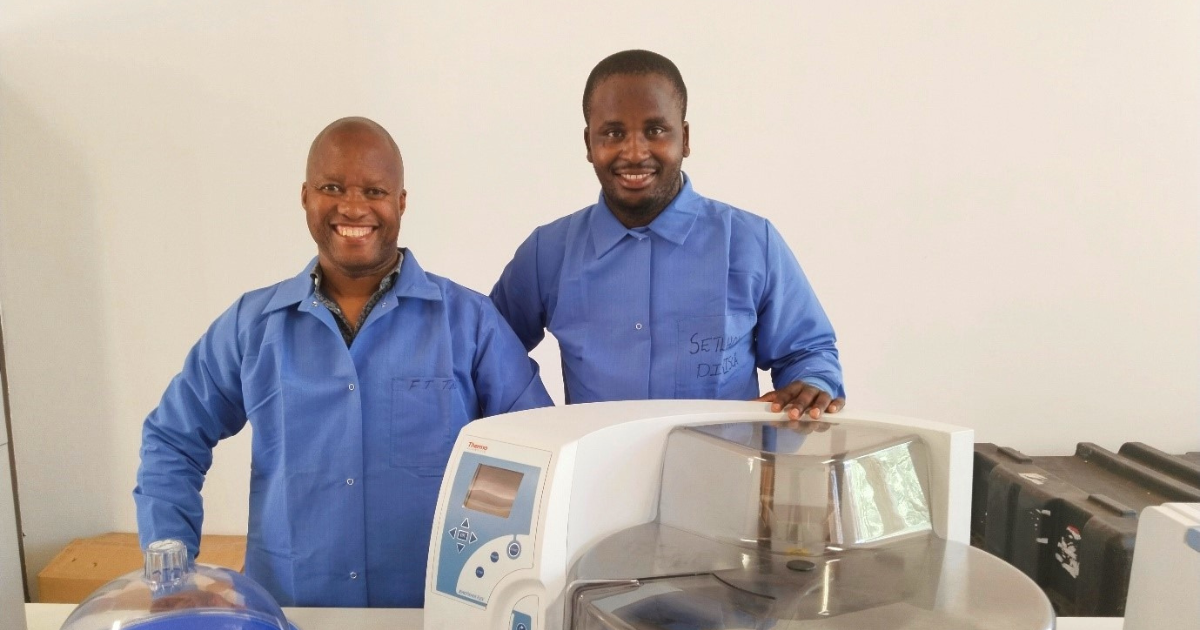Google “Botswana” and you’ll undoubtedly find images of large, striking animals crossing the Okavango Delta. Elephants, giraffes, zebras, and others flock to this region during annual floods, making it a region noted for its unique flora, fauna, and biodiversity.
As breathtaking as they are, though, this wildlife often overshadows Botswana’s other large animals: domesticated livestock, which are handled by small farms and industrial operations throughout the country.
There are more cows in Botswana than people, and they are essential to the survival of many farmers across the semi-arid country. While cattle farming is important to Botswana’s cultural identity, intensifying seasonal droughts threaten its future.
The lives of cattle—and the livelihoods of their farmers—are in real danger.
Climate change is threatening the health of cattle in Botswana—and the farmers who rely on them for income—by making access to healthy feed more difficult.
Dr. Force Thema is giving these farmers and animals a boost with climate-resilient innovations.
Looking to the future
For Botswana to move into a more sustainable and secure future, farmers there need to ensure that their animals have healthy feed, something that is in short supply as climate change makes accessing nutritious grains more difficult.
Force Thema, PhD at the Botswana University of Agriculture and Natural Resources, says change begins with something as simple as animal feed.
“Livestock is our livelihood,” he explains, noting the nation-wide benefits that come from having a healthy cattle population. “We need to know how to take care of them so that we can make sure people here have better health, food security, and education.”
It’s a bold claim to make, but Dr. Thema is certain that his work can deliver the kind of future that Botswana demands, where the country’s population enjoys a more secure way of life.
For the many rural subsistence farmers who rely on milk and beef production especially, animal nutrition translates directly to economic stability. When farmers can reliably produce milk and beef, they can count on selling those products consistently and making a dependable wage.
Tools to see solutions through
Dr. Thema now has the tools to see these ideas through. Previously, he lacked the equipment to run complex analyses to even assess animal nutrition, let alone address the problem itself.
Using equipment from Instrumental Access, Dr. Thema is developing a proprietary prebiotic for livestock, one that can allow animals to absorb more nutrients from their feed and produce more and better-quality beef and milk.
By analyzing current nutritional levels in the animals’ feed and comparing it with animal waste after feeding, he can understand how the cattle absorb their feed and what nutrients they need to support better digestion. With the right nutrition, livestock can be healthier and more productive.
From there, he says, it is a matter of developing the right supplement to ensure the health and productivity of livestock throughout Botswana.
“We are an agricultural university, and we focus on applied research, like these prebiotics,” he says. “These will result in more milk and beef production, and they will allow the feed to be fully digested.”
For a country looking to build a healthier economic future, Dr. Thema’s work is a much-needed push towards more security, potentially establishing stronger ties between university research and the agricultural sector.

Dr. Force Thema
Botswana University of Science and Natural Resources
Hope for a brighter, healthier future
Equipping Dr. Thema with modern scientific instruments is the first step to ensure that Botswana can move into a future with healthier livestock and more prosperous local farmers. It is a future he is excited to help make reality.
“I hope that this work will give us the information we need to improve the lives of farmers across our country,” he says. “So many people depend on livestock for their wellbeing, and we need to make sure that they are maximizing their profits so they can support their families.”











